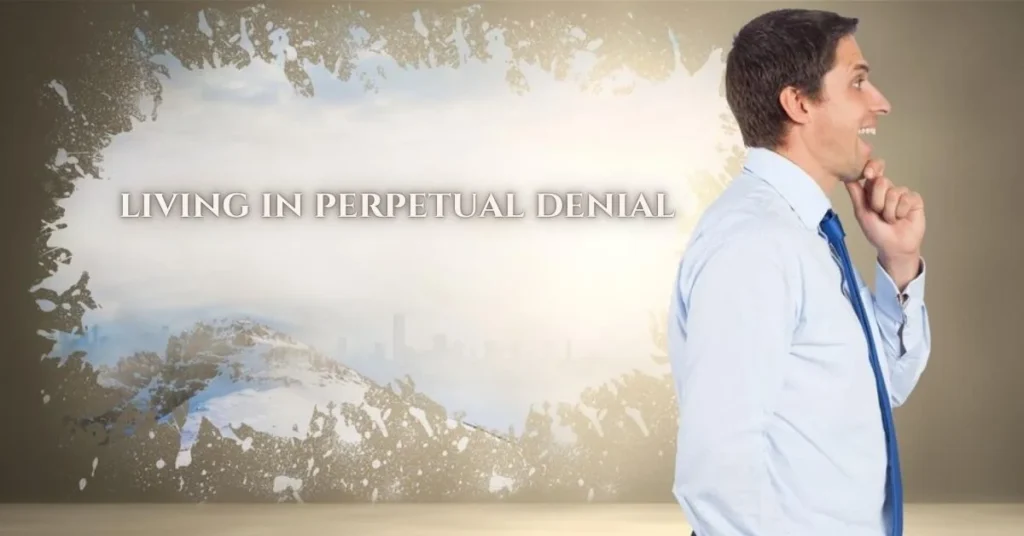Introduction to the living in perpetual denial
Are you living in perpetual denial? Many of us find ourselves caught in a cycle where we refuse to see things as they truly are. Whether it’s ignoring the signs of an unhealthy relationship or downplaying our financial struggles, denial can seep into various aspects of life. It’s comfortable, familiar, and often feels safer than confronting harsh realities. But what happens when that comfort starts to stifle growth? Acknowledging the truth can be challenging but liberating too. Let’s dive deeper into this complex issue and explore how accepting reality paves the way for a more fulfilling existence.
Common Examples of Denial in Daily Life
Denial often creeps into our everyday lives in subtle ways. Consider the friend who insists they’re fine despite a tumultuous breakup. They may laugh it off, avoiding deeper feelings.
Another common scenario is procrastination. Many people convince themselves that tomorrow will be better for tackling tasks, ignoring deadlines and responsibilities today.
Health-related issues also show up frequently. Someone might dismiss symptoms, thinking they’ll simply go away or claiming they’re just overreacting.
Financial denial can manifest as overspending on luxuries while ignoring mounting debts. The urge to maintain appearances can overshadow financial realities.
Relationships are not immune either. Couples sometimes overlook significant problems, insisting everything is okay while resentment brews beneath the surface.
These examples highlight how living in perpetual denial shields us from uncomfortable truths but ultimately keeps us trapped in patterns that hinder growth.
The Dangers of Living in Denial
Living in perpetual denial can create a false sense of security. It shields us from uncomfortable truths but often at a high cost.
When we refuse to face reality, unresolved issues linger like shadows. Problems don’t disappear; they grow, complicating our lives further. Denial acts as a barrier, preventing personal growth and emotional healing.
Relationships may suffer too. Friends and loved ones might feel frustrated or even betrayed when the truth is obscured by avoidance. Trust erodes over time as communication falters.
Moreover, living in denial can lead to poor decision-making. Without acknowledging facts, choices become misguided and irrational. This cycle perpetuates stress and anxiety rather than alleviating it.
Ignoring the signs of addiction or health-related issues can have severe consequences on physical well-being. The longer one stays trapped in these patterns, the harder it becomes to break free from them later on.
ALSO READ: Stuwk: The Ultimate Daily Life Enhancer
Recognizing and Confronting Your Own Denial
Recognizing your own denial can be quite the challenge. It often hides beneath layers of comfort and routine.
You might notice small signs, like dismissing a nagging feeling about a relationship or job. These thoughts may linger in the back of your mind, but you push them away.
Pay attention to your emotions and instinctive reactions. Do they feel disproportionate? This disconnect can reveal deeper truths you’ve avoided.
Journaling can help illuminate patterns too. Write down moments where you felt uneasy yet chose to ignore it.
Confronting denial requires courage; it’s about being honest with yourself. Acknowledge those uncomfortable feelings instead of brushing them aside.
Facing these realities is not easy, but it’s necessary for growth. Start small—ask yourself what scares you most about facing the truth.
Seeking Outside Help and Support
Seeking outside help can be a vital step when grappling with denial. Many people find comfort in talking to someone who understands their struggles. This could be a friend, family member, or professional.
Therapists and counselors specialize in guiding individuals through difficult emotions. They offer tools and strategies to confront uncomfortable truths without judgment. Sometimes, just having an empathetic ear can spark insights that lead to breakthroughs.
Support groups also provide a sense of community. Connecting with others facing similar challenges fosters resilience and shared understanding. It’s empowering to know you’re not alone on this journey.
Online resources are abundant too—forums, articles, and podcasts dedicated to personal growth can inspire new perspectives. Engaging with these materials allows for exploration at your own pace while reinforcing the importance of seeking support from those around you.
ALSO READ: Aviyne .com: Simplifying Your Life with Smart Digital Solutions
Moving Towards Acceptance and Growth
Moving towards acceptance often feels like a daunting journey. It requires vulnerability and courage to face what you’ve been avoiding. Yet, this is where real growth happens.
Start by acknowledging your feelings without judgment. Embrace the discomfort that comes with truth. This step opens the door to self-awareness and healing.
Next, set small goals for yourself. These milestones can help build confidence as you navigate through difficult emotions or situations. Celebrate each achievement, no matter how minor it may seem.
Surround yourself with supportive people who encourage honesty and understanding. Their presence can provide comfort when facing tough realities.
Practice self-compassion throughout this process. Remember that acceptance doesn’t mean giving up; it’s about adapting and finding strength in your truths as you evolve into a more authentic version of yourself.
Conclusion: Embracing Reality for a Fulfilling Life
Embracing reality can be daunting. Yet, living in perpetual denial offers only temporary comfort. It shields us from the harshness of truth but at a significant cost.
When we confront our realities, we open ourselves to growth and transformation. Acknowledging challenges fosters resilience and empowers change. Facing problems head-on enables us to find effective solutions rather than hiding behind falsehoods.
The journey towards acceptance isn’t easy. It’s filled with discomfort and uncertainty. However, this process is essential for true personal development. By embracing our circumstances—good or bad—we lay the foundation for a fulfilling life.
Living authentically means recognizing that every experience contributes to who we are becoming. Accepting flaws, mistakes, and setbacks allows us to move forward with clarity and purpose.
Facing reality enriches our relationships too. It opens doors for genuine connections based on honesty rather than facade.
Choosing acceptance over denial isn’t just about confronting what hurts; it’s about celebrating life’s complexities as they come—and finding strength within them for continual growth on this unpredictable journey called life.
ALSO READ: Scott Lynn Kilburg Obituary: Honoring a Life Well Lived
FAQs
What is “living in perpetual denial”?
Living in perpetual denial is when someone consistently refuses to accept uncomfortable truths, often to protect themselves from emotional distress. It can lead to avoidance of issues like health concerns, financial troubles, or relationship problems, preventing personal growth and healing.
How does denial affect our relationships?
Denial can strain relationships by preventing open communication. When issues are ignored or brushed aside, trust erodes, and emotional distance grows. Partners or loved ones may feel frustrated, disconnected, or betrayed.
What are some common signs that I might be living in denial?
Some signs include avoiding certain topics, making excuses for unhealthy behaviors, or feeling discomfort when facing difficult emotions. If you notice recurring patterns where you brush off your feelings or ignore red flags, denial may be at play.
How can I confront denial and start facing reality?
To confront denial, start by acknowledging the discomfort you feel when facing difficult truths. Journaling, speaking to a therapist, or discussing concerns with trusted individuals can help break through denial and promote self-awareness.
Why is it important to embrace reality instead of staying in denial?
Embracing reality allows for personal growth, healing, and better decision-making. Denial may offer temporary relief, but confronting truths leads to long-term well-being, strengthened relationships, and a more fulfilling, authentic life.







